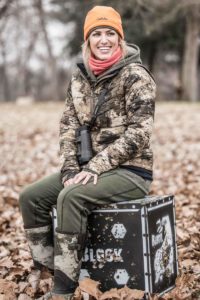PCS PARTNER PROFILE: EVA SHOCKEY
 The Project ChildSafe team recently sat down with firearms safety advocate and hunting celebrity Eva Shockey. Eva is a wildlife conservationist, an outdoors enthusiast and co-host of Outdoor Channel’s “Jim Shockey’s Hunting Adventures.” We chatted with her about hunting and the importance of firearms safety in the field.
The Project ChildSafe team recently sat down with firearms safety advocate and hunting celebrity Eva Shockey. Eva is a wildlife conservationist, an outdoors enthusiast and co-host of Outdoor Channel’s “Jim Shockey’s Hunting Adventures.” We chatted with her about hunting and the importance of firearms safety in the field.
Can you tell us about your background, how you were introduced to the world of hunting and how that led to where you are today?
My dad has been involved in the hunting world for my entire life. During my childhood, there were many hunting trips that were disguised as family vacations. This introduced me to being comfortable in the woods and learning to appreciate nature and wildlife. It was in this setting where I learned about the concept of field-to-table eating and having an appreciation and understanding of where my food comes from. Being around my dad’s T.V. show since I was 15 years old only strengthened my love for hunting and promoting a healthy outdoor lifestyle. This eventually turned into a career that I truly enjoy every day, promoting family, camping, hunting, fishing and encouraging everyone to get outdoors.
How do you go about practicing safety on the hunt?
Hunting safety has been engrained in my family for as long as I can remember. I learned about firearms safety before I started hunting, and the critical nature of safe gun handling was only further reinforced in the field. To my family, this meant respecting firearms and not treating them like toys – something that quickly became second nature for me. The lessons I learned very early on in life rolled over into taking safety very seriously while hunting. These habits range from never having your finger on the trigger unless you are prepared to shoot to wearing proper attire that is clearly visible, like hunter orange.
What tips do you have for a new or prospective hunter?
The best way to learn about hunting and hunting safely is to talk to someone who has been around it for a long time. If you don’t know any experienced hunters, seek educational resources. When I first started shooting, I took a gun safety course that taught how to shoot and handle a gun safely while reinforcing tips for how to always keep those lessons top-of-mind. I still practice what I learned from that class to this day. Additionally, I would urge new hunters to fully immerse themselves in the process, be comfortable with their firearms and create a safe environment free of surprises.
Do you have any tips for seasoned hunters?
It is our responsibility to pass on the rich tradition of hunting to the next generation. Include others and encourage them to have a safe and fun hunting experience. Invite those interested along with you, help them out and show them the ropes. I also find that putting ego to the side and making safety the number one priority is important for experienced hunters. In my family, we have taken our egos out of the hunting equation. It is a rule that when you hunt with us, you should not only feel comfortable pointing out to someone that they aren’t exhibiting safe hunting behavior, but you are required to do so. This means flagging unsafe habits to even the most seasoned hunters, something that might be uncomfortable in some groups. I only hunt with people who share this philosophy so that I know our common goal is to have a safe and successful hunt.
How do you advocate for S.A.F.E. hunting?
I like to promote firearms safety at every stage of the hunt. Familiarizing myself with local rules and policies is a key component of any trip, so I start with understanding the regulations of any relevant state, county or city. Once that is done, it is all about encouraging firearms safety, from checking if a gun is loaded to trigger and muzzle discipline. Even when I work with film or photography crews, encouraging firearms safety is essential – even if it means stepping in to enforce safety.
Project ChildSafe wants to promote S.A.F.E. hunting and remind outdoorsmen and -women to Store your firearms responsibly when not in use; Always practice firearms safety; Focus on your responsibilities as a firearms owner; and Education is key to preventing accidents. For more tips to ensure a safe hunt, check out Project ChildSafe’s hunting checklist and toolkit and take our Hunt S.A.F.E. quiz!
